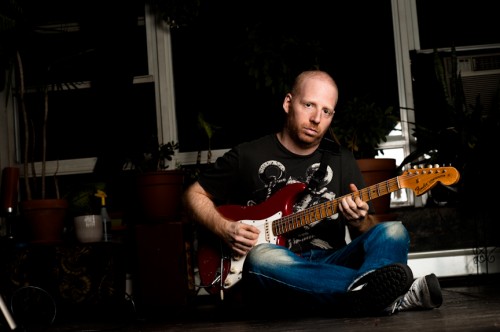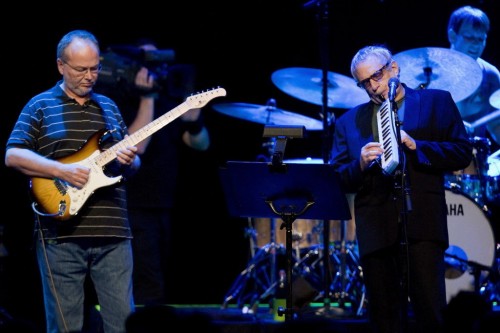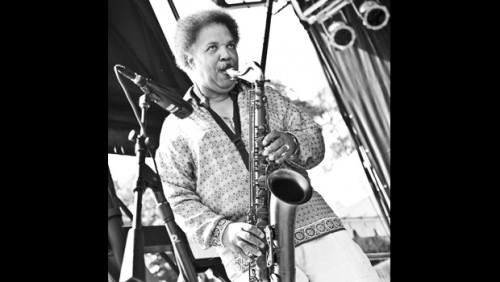By Michael Lello
For decades, Israeli-born and New York-based guitarist Oz Noy has been impressing audiences – and fellow musicians – landing the likes of Chick Corea, Allan Toussaint, John Medeski, Eric Johnson and Dave Weckl to play on his albums.
The scary thing is he feels he’s not yet the player he wants to be.
“There’s a billion things to improve on,” he said last week, calling Highway 81 Revisited from New York.
His brand-new album, “Twisted Blues Vol. 2,” dropped this Tuesday, May 20. It features the aforementioned Weckl, Medeski and Toussaint, as well as Will Lee and Anton Fig from David Letterman band fame, Eric Johnson and Warren Haynes. His current touring band features Allman Brothers Band bassist Oteil Burbridge and drummer Keith Carlock (Steely Dan, Sting). We spoke with Noy in advance of his band’s show this Thursday, May 22, at the River Street Jazz Café.
H81R: How would you describe the music scene and music business in Israel?
ON: I haven’t lived there in almost 20 years so I don’t know how it is there now. I visit there but I just go for a visit.
When I was growing up, before Internet and all that stuff, I grew up on the Beatles and Israeli pop or rock music was just influenced by American or English music, and then I was introduced to jazz by my brother.
In terms of the live scene there, when I used to live there, there was a lot of love for jazz in Israel and really good education for it, so I was always able to play a lot of jazz gigs when I was growing up, which was good. At the time when I was growing up, the level wasn’t that high, so if you become professional enough you can work in the pop scene and do rock gigs and stuff like that, so I was kind of good enough to work there from a young age. It’s a small scene, but it’s a small country. I was playing a lot and working a lot and able to develop. I’m guessing it’s the same now, but I don’t know.
 H81R: Did you feel you needed to move to the United States to pursue your career?
H81R: Did you feel you needed to move to the United States to pursue your career?
ON: Yes. Yes. I was 24 when I moved here, and by that time I had pretty much done everything I could do over there musically and artistically. I could’ve stayed there and worked with this singer and that singer and done another TV show or another this or another that, but it wasn’t what I was going for. It would’ve just been the same of the same. And the music that I liked was in New York anyhow.
H81R: Tell me about the recording of “Twisted Blues Vol. 2.”
ON: The process of making all my records is the same, whether it’s the “Vol. 1” or the “Vol. 2” or any of them. I usually have a concept for a record, and I play in New York every Monday at The Bitter End, so I have the opportunity to write music and then play it live and develop it. So that’s really the process of all my records. I write the music in the course of a year or two and I would play it in the club usually or for a tour, and when I have the whole record ready to record, I would just go in and record the record. All of the music that I play has been played live for a while, and not just for like one gig, you know what I mean? I don’t believe in just going in and showing the guys a chart and playing it. It has to gel, not only for me but for everybody. I work with a lot of great guys and it’s the same process for everybody.
The last record took long, because I’m very specific about who I want to play on certain tracks; a lot of times when I write the track I’m already thinking about the drummer or the whole band that would play on it. So it took a while to record, not the actual recording process, but to get the guys in the room together at the same time was spread out over a year.
H81R: You have some serious guests on the album. What does it mean to you have people like Chick Corea and Dave Weckl and so on play on the record?
ON: With Weckl I played for years, so I have a real good kind of connection with him when I play. It’s great. He’s like one of my favorite drummers of all time. A couple of years ago, somebody asked me who I’d like to play with, and I said Dave Weckl, so it’s great, and now we’ve done a bunch of tours together and a lot of playing, so I’m really connected to his playing. So that’s kind of a normal thing for me by now.
The thing with Chick was like really exciting because I never played with him and he was nice enough to do this and it’s amazing, he’s like my hero.
H81R: This lineup – Oteil Burbridge and Keith Carlock — obviously they are both amazing players. How did you pick them for the band, and what have they brought to your music?
ON: Well with Keith, Keith and I moved together at the same time in ’96, so I’ve been playing with Keith since then. He’s probably the drummer I played with the most in my life. He doesn’t sound like any other drummer, he’s his own thing. He brings his thing to the table, which is Keith Carlock, and that’s what it is. Oteil was a call that actually my record company guy suggested. I knew Oteil because sometimes I’ll sit in with the Allman Brothers, and I knew him before from his previous work, but the guy from our record company said, “Hey man, you should do something with him, it could be really a good combination,” and I was like, “Sure, I’d be happy to.” We talked for a while and he suddenly became available and we’re just making it happen. We already played a little bit and it’s great.
 H81R: You’ve played all over the world. Do you have any favorite venues or cities in which to play?
H81R: You’ve played all over the world. Do you have any favorite venues or cities in which to play?
ON: Well, good question. In terms of the cities, it doesn’t really matter to me. I like certain venues, like the Iridium is cool here in New York, Catalina in Los Angeles is cool, Jazz Alley in Seattle is cool, Yoshi’s (in Oakland). I like the clubs, because usually the sound is good and people are coming to listen. But I also like to play the Bitter End and The 55 Bar in New York which is kind of a bar vibe but it’s much looser, so you can just kind of play what you want.
H81R: When you started playing, did you think you would get to this level professionally?
ON: It’s hard to say. I wanted to, but I don’t feel like I’m at the level I want to be at, so it’s a work in progress. I hope to get to the level I want to (laughs).
H81R: What is that level? Are there certain aspects of your playing you want to improve, or do you want to become more well-known?
ON: That definitely helps, but playing-wise there’s a billion things to improve on.




Leave a Reply